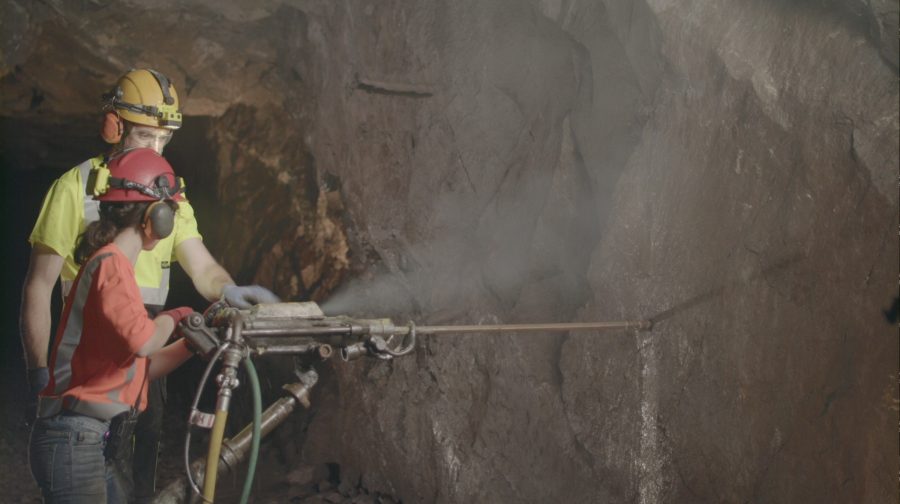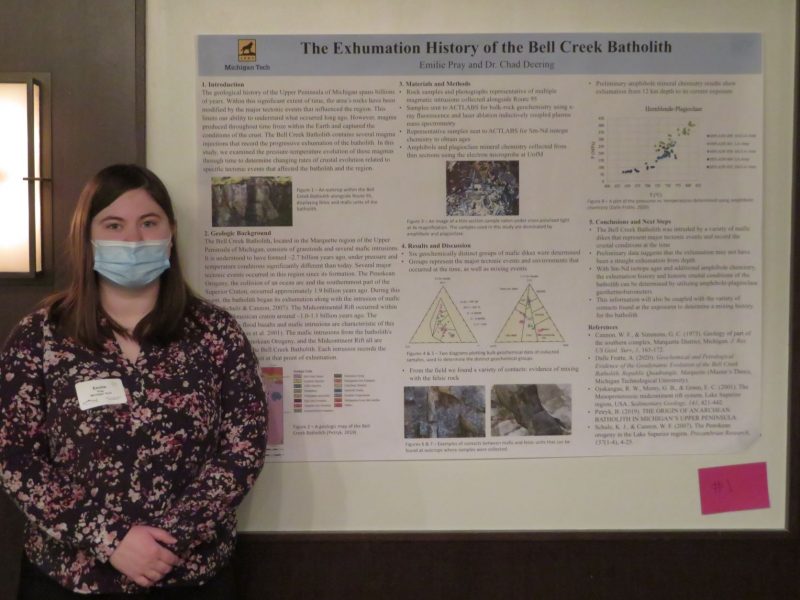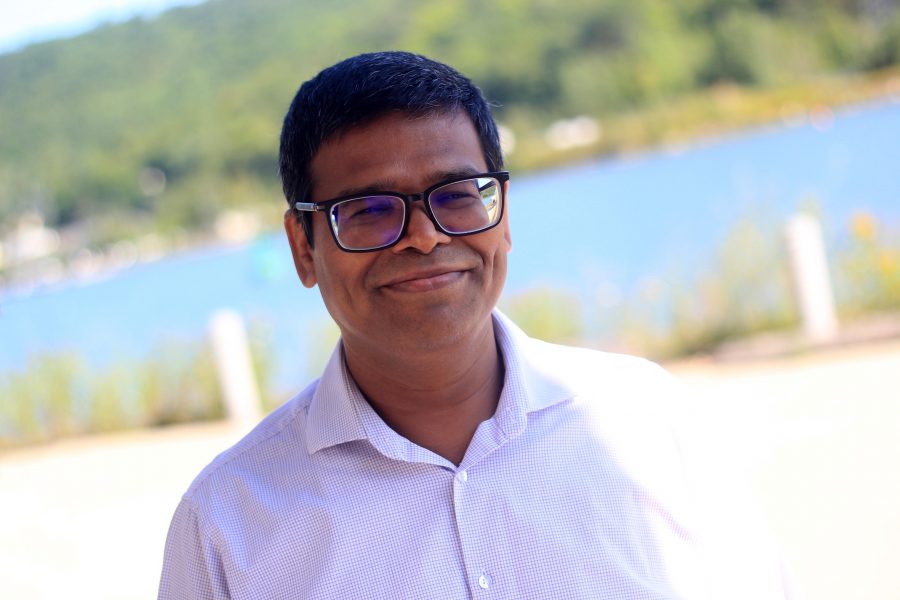Emilie Pray, a geology senior in the Department of Geological and Mining Engineering and Sciences (GMES), won first place in the American Institute of Professional Geologists (AIPG) Michigan Section Annual Student Poster Contest.
Pray’s poster was titled “The Exhumation History of the Bell Creek Batholith.” Her research has been advised by Chad Deering (GMES).

Michigan Technological University’s bachelor’s degree program in mining engineering has been accredited by the Engineering Accreditation Commission of ABET, the global accreditor of college and university programs in applied and natural science, computing, engineering and engineering technology.
ABET accreditation assures that programs meet standards to produce graduates ready to enter critical technical fields that are leading the way in innovation and emerging technologies, and anticipating the welfare and safety needs of the public.
Michigan Tech’s mining engineering program is one of only 13 such degree programs across the nation to earn ABET accreditation. In total, 13 different ABET-accredited degree programs are now offered by the College of Engineering at Michigan Tech.
“ABET accreditation is a significant achievement,” said Aleksey Smirnov, chair of the Department of Geological and Mining Engineering and Sciences (GMES). “We have worked hard to ensure that our program meets the quality standards set by the profession. And, because it requires comprehensive, periodic evaluations, ABET accreditation demonstrates our continuing commitment to the quality of our program — both now and in the future.”
“This is a recognition by ABET that our students and the program meet the accreditation standards,” said Leonard Bohmann, Michigan Tech’s associate dean of academic affairs in the College of Engineering. “It signals to students that when they come here they will receive a strong education in mining engineering that has been rigorously reviewed. It informs employers that they can be confident that our students have an outstanding education in mining engineering. And, with an ABET accredited degree, students can become licensed professional engineers.”
“This success came through the dedicated and indefatigable efforts by Professor John Gierke, who served as department chair from 2014 to 2020, and our superb mining engineering faculty, Associate Professor Snehamoy Chatterjee and Senior Lecturer Nathan Manser,” added Smirnov. “Outstanding clerical support was provided by department staff Brittany Buschell and Carol Asiala.”
The pandemic created additional challenges during the accreditation process, but also opportunities, noted Gierke. “The responses to the onset of the pandemic in 2020 disrupted the installation of mine ventilation lab equipment. In addition, videos and video calling were required for the facilities tours as part of the virtual site visit. The need to thoroughly review the facilities was extra challenging in the virtual format.”
Despite the fact that their final few months had to be conducted remotely, the adaptability of the students during their mining engineering senior capstone project — along with their advisor, Nathan Manser — allowed that project to conclude on several high notes. “The senior students quickly learned how to use mine design software remotely, how to meet on Zoom and collaborate online,” Gierke said. “They probably didn’t realize it at the time, but with their increased use of remote collaborations in professional work, the students all got some accelerated practice.”
Michigan Tech’s degree program in mining engineering was reinstated in 2019 after a 15-year hiatus. In order to apply for accreditation, however, GMES had to wait until at least one student graduated with the degree. “We graduated our first three students in the spring of 2020,” said Smirnov.
“The University is proud to see mining returning as an ABET-accredited program,” said Jacqueline Huntoon, provost and senior vice president for academic affairs. “Michigan Tech was initially founded to support the mining industry and it is exciting to see us reaffirm our commitment to excellence for this segment of industry.”
Sought worldwide, ABET’s voluntary peer review process is highly respected because it adds critical value to academic programs in the technical disciplines, where quality, precision and safety are of the utmost importance.
Developed by technical professionals from ABET’s member societies, ABET criteria focus on what students experience and learn. ABET accreditation reviews look at program curricula, faculty, facilities and institutional support, and are conducted by teams of highly skilled professionals from industry, academia and government, with expertise in the ABET disciplines.
ABET is a nonprofit, nongovernmental organization with ISO 9001:2015 certification. It currently accredits 4,307 programs at 846 colleges and universities in 41 countries and areas.
Michigan Technological University is a public research university founded in 1885 in Houghton, Michigan, and is home to more than 7,000 students from 55 countries around the world. Consistently ranked among the best universities in the country for return on investment, the University offers more than 125 undergraduate and graduate degree programs in science and technology, engineering, computing, forestry, business and economics, health professions, humanities, mathematics, social sciences, and the arts. The rural campus is situated just miles from Lake Superior in Michigan’s Upper Peninsula, offering year-round opportunities for outdoor adventure.
Associate Professor Snehamoy Chatterjee is the new Witte Family Endowed Faculty Fellow in Mining Engineering, named in July 2021.
“Dr. Chatterjee has been instrumental in developing Michigan Tech’s new interdisciplinary Mining Engineering program,” said Aleksey Smirnov, Chair of the Department of Geological and Mining Engineering and Sciences (GMES). “He teaches courses in the program, and very skillfully incorporates research into his instruction.”
Chatterjee’s position as Fellow is made possible through the generous support provided by Nancy Witte and her family, in memory of her late husband Richard C. Witte, who received a BS in Metallurgical Engineering from Michigan College of Mining and Technology (now Michigan Tech) in 1950. After graduating from Michigan Tech, Witte went on to earn a Juris Doctorate from Indiana University School of Law in 1956, then worked for Proctor and Gamble as a patent attorney. Witte was admitted to the bars of Indiana and Ohio, US Court of Appeals, Federal Circuit, and the US Supreme Court, and filed more than 1400 patents before he retired in 1992 as vice president and chief patent counsel for Proctor and Gamble Worldwide.
“The future of the mining industry is transforming in the digital age,” says Chatterjee. “Our students need to understand the traditional mining engineering techniques that have dominated the industry for generations, but also be technically savvy enough to see how the newest digital innovations might fit into a better decision making or engineering design process. I am grateful to Nancy Witte and the Witte family for this endowment and the tremendous support it provides toward this important endeavor.”
Decision-making under uncertainty, a research focus for Chatterjee, is one example, says Smirnov. “Students in one of Dr. Chatterjee’s courses, called Resource and Reserve Estimation, first learn how to quantify uncertainty based on spatial and temporal data. In his next course, Mine Planning and Design, they learn how to integrate that uncertainty into their mine plan using stochastic optimization methods.”
“Dr. Chatterjee’s outstanding achievements and contributions to our newly reinstated mining engineering program make him an ideal candidate for this faculty fellow position.”
In addition, Chatterjee works with undergraduate student researchers in his lab, and encourages them to present their findings at national or international conferences. Several have published their studies in peer-reviewed journals, as well.
“While at Michigan Tech working with Dr. Chatterjee, Alex Miltenberger ’17, a geophysics major, presented his SURF research work at Geostat, an international conference in geostatistics,” notes Smirnov. Miltenberger is now postdoctoral researcher at Lawrence Berkeley National Laboratory & Stanford University.
“Another student working with Dr. Chatterjee, Katie Kring, published her SURF research in the International Journal of Rock Mechanics and Mining Sciences,” he adds. Before graduating from Michigan Tech with both a BS and MS in Geological Engineering, Kring interned at Freeport-McMoRan’s Chico Mine. She now works as a Civil Engineer at US Army Corps of Engineers.
Chatterjee also encourages his undergraduate research students to submit proposals for external funding. Current geophysics student Grace Ojala recently received a Michigan Space Grant Consortium (MSGC) grant to research mining slope movement using synthetic aperture radar data.
Chatterjee has been recognized nationally and internationally through several professional and editorial awards, and invited presentations and seminar talks. Recently, Governor Gretchen Whitmer appointed him to the Michigan’s Future Mining Committee. Chatterjee was chosen to represent current or former research faculty members who hold a master’s or doctorate degree in mining or geology at a university in Michigan.
Richard Witte, throughout his career and even after his retirement, served on numerous federal, state and local commissions, delegations and boards, addressing a variety of international diplomatic and intellectual property policies.
“Dr. Chatterjee’s appointment as Witte Fellow aligns perfectly with the objectives formulated by the Witte family and Michigan Tech,” said Janet Callahan, Dean of the College of Engineering at Michigan Tech. “Our shared goal is to retain and attract high quality faculty who are at the top of their profession, inspire students to think beyond the classroom material, and integrate their research into the classroom.”

